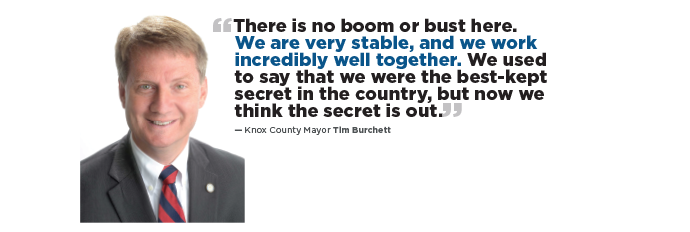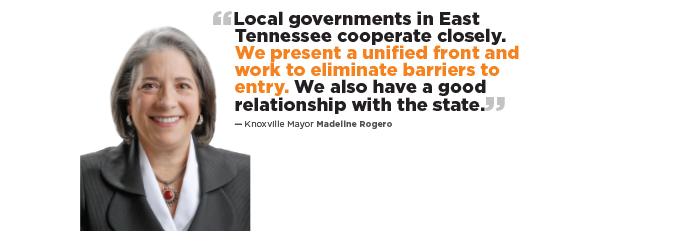When your state lands the granddaddy of them all – a $10 billion data center investment by Amazon Web Services – what do you do for an encore?
If your state is Mississippi, you celebrate momentarily and then turn around and press for more.
That is exactly what Gov. Tate Reeves and his administration are doing today in Jackson, Mississippi. Not content to rest on laurels, they are plowing ahead with plans to make the Magnolia State one of the most successful in the nation. And the results from early this year show they are well on their way.
In a recent interview with Gov. Reeves, we asked him to explain the significance of the signature AWS win and describe how he plans to lead the state toward future economic development dominance.
You recently broke ground on the largest capital investment project in state history. How significant is this investment by Amazon Web Services in Mississippi?
GOV. TATE REEVES: It is historic, massive and game-changing. This is a big, big deal for Mississippi. They are one of the five biggest companies in the world, and they are choosing to invest $10 billion here. That gives you an understanding of the confidence that some of the biggest companies in the world have in us. This project will create 1,000 new high-paying, high-tech jobs in our state. The average annual wages of these jobs will be $25,000 more than the current average annual wage in Mississippi. That does not even take into account what could be in excess of 10,000 construction jobs to build these facilities. The message this deal sends to every other company in the world is a significant one. It says, “Come here. Mississippi is open for business.”
Unemployment has reached a record low two months in a row in Mississippi. To what do you attribute this?
GOV. REEVES: We make it easy to do business in Mississippi, and we make it easy to find a job in our state. We are seeing company after company move to our state. We are seeing companies expanding with huge capital investments as well. We are now around 2% unemployment in Mississippi. We want everyone who wants a job to have the ability to get a good-paying job.
Mississippi is investing nearly $150 million into site development. Why is this necessary, and what do you hope it will accomplish?
GOV. REEVES: When I first got elected four and a half years ago, I spent a good amount of time on the phone with site selectors around the country. They all told me that there are not enough project-ready sites in Mississippi or in the Southeast or in the U.S. as a whole. We need to have more sites ready and available for development. We decided as a state to invest significant resources to get our sites ready. I challenged our team to identify the top 30 sites in Mississippi.
We want 30 sites available at all times. We went to look for resources to invest in infrastructure around those sites. We cobbled together over $87 million for site development over the last three years. We got another $50 million for site development this year. We will have that money available for grants to those 30 sites. We are now close to $150 million approved for site development. We are investing in roads, sewers, rail and utilities, etc. Our 30 sites are of a lot of different sizes and in a lot of different regions in our state.
We continue to get asked about incentives and the workforce. More often now, companies are leading with speed to market. That is one of the single most important avenues for companies looking to locate. We have so many sites that are shovel ready. We will make more.
 “We have deployed career coaches to all our school districts to help connect high school students to jobs that are available. We now have 80% of our school districts that have a career coach.”
“We have deployed career coaches to all our school districts to help connect high school students to jobs that are available. We now have 80% of our school districts that have a career coach.”
– Gov. Tate Reeves
You have made education one of your administration’s top priorities. How is the state doing in that regard?
GOV. REEVES: There are a lot of people around the country who when they think about education results in Mississippi, their brain immediately goes to 50th. I have never believed that to be accurate. However, there were statistics 10 years ago that would suggest that. That is simply no longer the case. We instituted reforms in 2012 and 2013. We have had an historic run since then. The New York Times called it the Mississippi Miracle. Mississippi went from being 49th in the country in fourth-grade reading to 21st. In fourth-grade math, we went from 50th to 23rd. The high school graduation rate went from the low 70s to almost 90% of all Mississippi kids last year. It is now an all-time high graduation rate and better than the national average. These miraculous results are happening not just for some kids in Mississippi. We were 45th in African American reading. Now we are fifth best in reading results for African American students. Our mission is to take education from good to great.
How is Mississippi doing on the workforce development front? Are there any benchmarks you would like to see your state achieve in this area?
GOV. REEVES: Education begins Pre-K thru 12, but we know we have to stress lifelong learning and continue to train and retrain our workforce. We have invested significant resources to do that by creating Accelerate MS as our lead agency for workforce development. We have awarded $127 million to 15 new and expanded programs to help train Mississippi residents. We are investing in those programs to train Mississippians for jobs that will be in demand the next 50 years. We have deployed career coaches to all our school districts to help connect high school students to jobs that are available. We now have 80% of our school districts that have a career coach. Only one in four of our high school grads go directly to college. We needed to address the other 75% who graduate and then go directly into the workforce. Worker training in Mississippi is now working exactly the way it was intended to.
The aerospace industry is an important sector in your state. How is it growing, and are you able to nudge that growth forward with any special initiatives?
GOV. REEVES: The growth of Mississippi aerospace has been incredible. Things are happening here that are not happening anywhere else in the world. We are proud of the role we play in the nation’s defense and in rocket testing. Great aviators and pilots are trained here for the U.S. Air Force. Our industries have been at the forefront of unprecedented activity in Mississippi. Since 2020, aerospace alone has brought over $750 million in new investment and over 4,400 new jobs to our state. We have also made strategic investments. We created the Governor’s Office of Military Affairs. We support the Installation Commanders Council. We also have the competitive advantage because we have the Stennis Space Center in the southwest corner of the state and military bases spread out all over our state.
Affordable housing and child care continue to be pressing issues for workers and employers alike nationwide. Is anything happening in Mississippi to help average working families attain either affordable housing or affordable, quality child care?
GOV. REEVES: I proposed in my budget last year that we should have a child care tax credit for working parents. That did not get across the finish line this year, but we will continue to push for that. We certainly think that affordable housing is an area where we have a competitive advantage in Mississippi. We are a very affordable place to live. And we have initiatives in place for workforce housing.
What do you think has been your administration’s most significant accomplishment to date?
GOV. REEVES: It is hard to narrow it down. I am proud of where we are today. Mississippi is better positioned today for more capital investment and more growth than ever. Consider what we have accomplished:
- Lowest unemployment rate in state history.
- Largest capital investment project in state history.
- Three projects in excess of $2 billion.
- Highest high school graduation rate in state history.
- Largest tax cut in state history.
- Largest infrastructure investment in state history.
- More high-paying jobs available today than ever before.
We will continue to do that. We are dedicated to making Mississippi better. Our challenge is to make people come here once. If they do that, they are sold on Mississippi.




